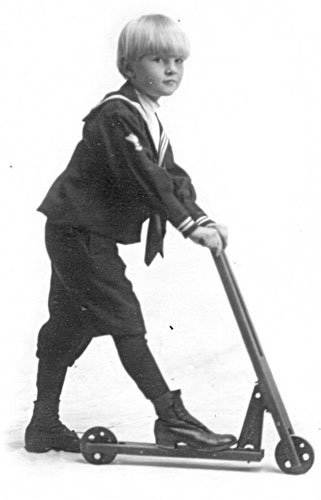GoCycles Near and Far by Alan Borer
Photo From Westerville Public Library’s ‘Historic Photographs of Westerville’ collection
Many local folks know about the “Gocycle.’ Manufactured in Westerville starting in 1907, the wood and iron scooter was a hefty toy, no doubt. A product of the Hance Manufacturing Company, the Gocycle was one of many various products springing from the fertile, if occasionally off-beat, creativity of the Hance family. From farm equipment to fairground peanut roasters, Hance products reflected life, and consumer demand, in the United States in the first half of the twentieth century.
We don’t have exact statistics, but the GoCycle sold very well for its time. It was commonly reported that sales of GoCycles were in the hundreds of thousands.
“. . . while this little toy has been on the market only a little more than a year, there are now more than 200,000 in use. . . The Hance Company reports that the demand for these toys is constantly increasing, and the number already sold has gone far beyond their fondest hopes.”[i]
Selling that many of anything was impressive. Connecting a clever toy to imaginative advertising is one way to make a fortune, even in modern America:
. . . . it is absolutely safe as it Can Be Stopped Very Easily by Simply Stepping Off; it is Nearly Impossible to Fall Backward of Forward. There is Enough Skill Required in Propelling the Gocycle [sic] to Make it Fascinating to Boys and Girls of Any Age. . . .[ii]
Those of us who are parents know that children push the limits of any toy marked “safe.” Advertisers who claimed it was “nearly impossible” to fall off a GoCycle practically guaranteed that a random moppet would in fact fall off, suffering from a stubbed toe to a major head injury or something in between.
Searching for GoCycle casualties, I found instead evidence of just how widely the scooter was distributed. Westerville (1910 population 1,903) shipped GoCycles far and wide, and to much bigger population centers. One big distributor of GoCycles was the Shapleigh Hardware Company of St. Louis, Missouri. Not well remembered today, Shapleigh was once as well-known as Walmart is today. It had a very long history. Founded in 1843 by Augustus Shapleigh, the company started by offering a handful of tools. It published catalogs by 1852, and sent out traveling salesmen by 1848 [insert traveling salesman story joke here]. Use of the “Diamond Edge” trademark started in 1864. Mr. Shapleigh oversaw healthy, steady growth. He died in 1902. Mergers and reorganizations followed, but such was the stability and durability of the company that it lasted until the 1960s.[iii]
A loose page from the Shapleigh Hardware catalog of about 1910, shows the GoCycle at the height of its glory. [Figure 1] The catalog was big; the GoCycle was featured on page 2622, right next to the hobby horses. When one considers that tiny Westerville was selling a product to a giant corporation in giant St. Louis, we learn, or at least ponder, the economies of scale in a newly industrialized America.
Figure 1
-Alan Borer
[i] Toys and Novelties, November 1913, p. 57.
[ii] Catalog page, Author’s collection
[iii]http://www.thckk.org/history/shapleigh-history.pdf


